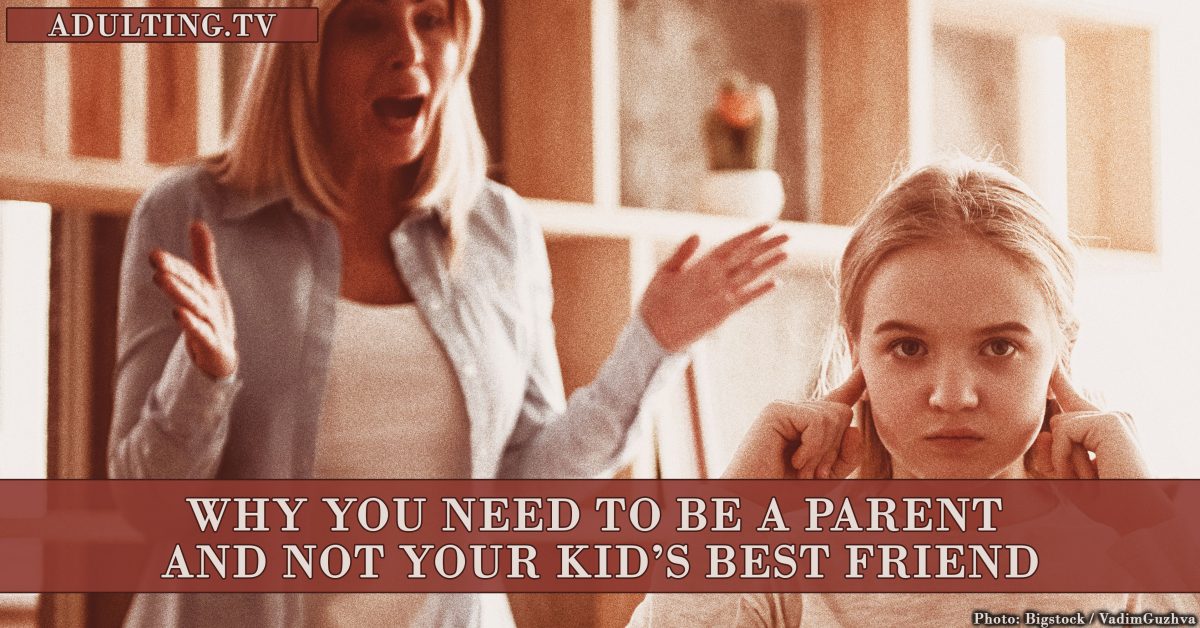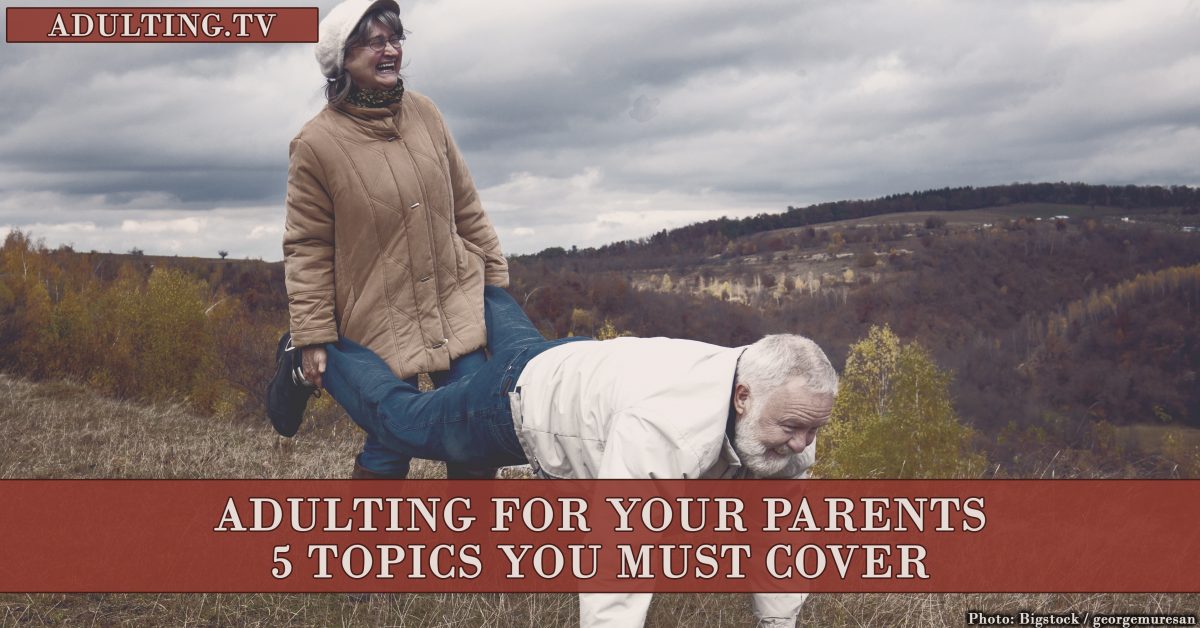Too often, the holidays turn into a time of stress as we try to live up to expectations from family and friends.
While it’s preferable to avoid a holiday showdown, sometimes it can’t be avoided. In this episode, we talk about how to figure out what matters this holiday season, as well as how to set boundaries.
How much is too much this holiday season? And can you draw the line without it turning into a holiday showdown? Our Do Nows help you learn how to set healthy boundaries, as well as identify the biggest stressors that could be dragging you down.
MIRANDA-Sometimes the holidays are more stressful than maybe they should be. In this episode, we’ll take a look at some strategies you can employ to reduce your holiday stress.
HARLAN – Intro
HARLAN – Welcome to Adulting. I’m Harlan Landes, and I’m here with Miranda Marquit, as usual. How are you doing Miranda?
Miranda – I’m doing well, how are you today Harlan?
HARLAN- I am fantastic. So! Today we’re talking about satisfying your relatives during the holidays. And what it takes to survive the holiday season as an adult. So, is this a study from Stanford University?
Miranda- It isn’t exactly a study so much as it is something the assistant director of Stanford’s faculty and staff help center talks about. She talks about some of the pressures that the holidays cause, and the research shows make the holidays difficult for people – and family relationships – which is all of us, right? We all have family relationships, and one of the things that she points out is that people want to belong and feel connected during the holidays. This desire can be so strong that we overextend ourselves emotionally, physically, and financially. And then she goes on to say that examples of this include spending money to travel to be with family and loved ones even though you’re finances are limited. She talks about buying gifts that you can’t afford, attending social family functions because we feel like we HAVE to or because we feel like we should, and then also on our end, maybe preparing an elaborate perfect meal or celebration. So we put all the stress on ourselves to provide the perfect atmosphere for celebration with somebody else. So it’s this thin line, and she talks about how all of these pressures can combine to create a holiday season that isn’t quite as cheerful as we’d like it to be.
HARLAN-we just want to enjoy this time with our families and friends and loved ones, so does this pressure need to be there? Are we putting too much pressure on ourselves? Is there any way that we can avoid this?
Miranda-That’s hard. It’s hard to get beyond that. I know that what’s interesting is, a lot of the times these holidays are tied up in faith traditions. As we get older, we may be stepping away from our faith traditions of our youth. And that is something that I am dealing with right now is stepping away from the faith traditions of my youth, and how do I go about that — the nice thing about celebrating Christmas is that in a lot of ways it’s not about Christmas. It’s not about Jesus for a lot of people, and so it’s more a wider cultural phenomenon. There is that element of it being a little bit easier from that standpoint, but at the same time, there are still some family expectations and some family things that are talked about in my faith tradition during the Christmas season. I’m navigating that right now trying to figure out, how do I back slowly away from my faith tradition while still enjoying that family holiday spirit. Is that something that you have to deal with as well?
HARLAN- No, it’s been a little bit different for me. First of all, I am Jewish, and religion wasn’t always a big part of my household, except to the extent that I wanted to make it something that I was pursuing on my own, if not actively in my house with my family. My brother and I grew up celebrating Chanukah, which unlike Christmas, is not a major holiday for the Jewish religion in the way that Christmas is perhaps is for the Christian religion. However, because it happens around the same time as Christmas, more attention is given to this holiday, and in the tradition of gift giving. It is something that my parents did want to make as part of our experience growing up. At the same time we also recognized that while we were celebrating Chanukah, the rest of our environment was celebrating Christmas, but, so, I don’t think we had a Christmas tree, but we certainly did understand that Christmas was more than just a religious holiday in the United States. That was something that was kind of out there and is secular, and people are participating, and my parents were certainly interested in having us as children be a part of the society that was around us. So we participated in some Christmas type things like giving gifts for Christmas, if not going all out. It was a line that I was always on. I know that my parents like telling this story: They brought me to the mall doing some holiday shopping, and of course there was a Santa Claus dressed up in the mall, and he came up to me and said, “Merry Christmas” and I said, ‘Happy Chanukah’ in response to him and he was taken aback, didn’t know what to say, and of course I lived in an area at the time that did not have as much representation in diversity that some of the places that I’ve lived later on in life. So it was kind of a funny experience for some kid to say something to Santa that he didn’t expect. It’s all about family. I mean, my mother is probably more the side of Wiccan even, celebrating nature, celebrating the earth, instead of making something more Judeo-Christian out of the season.
Miranda-Right, and that’s interesting as well, this idea of, well maybe I want to incorporate more of the wiccan or pagan or solstice related activities into my situation while the rest of my family has no understanding of that sort of side of things. It’s an interesting line that you do have to walk. And then once again we have this whole, as mentioned in the Stanford article, we have this whole — not only do we have these traditional type expectations of us, but we feel like things have to be perfect for the holidays. We have to have perfect decorations; we have to have this perfect meal. We have to have this perfect party; we have to find the perfect gift for whoever we’re giving this gift to. Everything has to be perfect. And I think that’s one of the things that makes the holidays so challenging. So how can we get beyond that? How do we deal with this idea of perfection around the holidays?
HARLAN- We has to let go of this burden. This is a huge burden. And maybe it’s hard for me to understand because I never had to deal with it in this way, but there’s no reason that anything has to be perfect in our lives. We can just do our best to create the best environment for spending time with our family. And this idea that we have to live up to some expectation which I think probably comes more from the media than comes from anything else when it comes to the pressure to have a holiday set up in such a way that everything is pristine. I guess I just don’t get it. I mean, even the people I’ve been close to who have celebrated Christmas don’t feel this kind of pressure because there’s an understanding that we just have to be perfect, we just try to put together what we need in order for our family to feel comfortable and to feel the love that we have for each other. And certainly, that’s not going to come from some pristine demonstration or display. So I don’t know, so you tell me how to deal with something like that.
MIRANDA- I think it’s really difficult, and it’s nice that you come from an environment where you didn’t have to worry about that. But in the culture I was raised, there’s a lot to do with the image you’re projecting and the holidays have a lot to do with that. Part of that too is once you get to a certain point, is learning how to set boundaries during the holiday season, whether it’s, ‘do I have to go to one more family party?’ And that’s one of the hard things too; there is so much going on. And do I have to go to every family party? Do I have to do all these things? And I think that setting boundaries is one of the ways that you can step back and say, ‘yes, I love you, and I want to have this situation with you, and I want to celebrate the holidays with you,’ but at the same time, this might be too much. Because we have work, we have to worry about getting our stuff together and then do we need to go to all parties and get all these presents and take care of all this stuff. I think part of that is learning to set boundaries and try and figure out how to work with that.
HARLAN-Sure I think I probably benefitted in some way from having a smaller family. And I know a lot of people will, if they have seven siblings, as adults, they’ve got a lot of people to pay attention to when the holidays come around. That’s got to be difficult to juggle. And I understand that completely. And just having a plan, and saying, ‘Listen, I can’t see your family this year, but next year you can visit me, and I’ll visit someone else, and then the year after that …’ You just have to set up a plan that makes sense and explain to everybody that we have a lot of responsibilities, this is the way we’re gonna make it work, and it’s not gonna be what everybody wants, at any one time, but at the same time, everyone else is juggling the same responsibilities. So I think they are going to ‘get’ it.
MIRANDA- I think part of it too goes back to what we’ve talked about in the past, about that communication. And being up front about what you can and can and cannot do. Whether it’s saying ‘Let’s set up a gift exchange,’ that’s fine, but with my family this year I have four siblings. And one sibling has four children, another has three children, and then another will have two children by the time we get to Christmas. And so there’s a lot of children running around, there’s a lot of siblings to begin with, and finally this year, one of my siblings just sent a family group text that said, ‘This year are we going to just draw names out rather than trying to find gifts for everybody – let’s just do this one gift exchange where we just draw names out.’ And communicating and being up front and saying, ‘This is what I’d like to do,’ that can help. And we all said, ‘Hey, that’s a super fantastic idea. Let’s set up a gift exchange for the kids – where you draw a name out of a hat, and that’s the cousin you’re going to get a present for,’ and then the rest of us will draw a name out of a hat and that’s the adult person that we’ll get a person for. That way kind of limits the stress you’re under, but it’s just that simple thing where you give yourself permission to say, ‘let’s try something new, ‘ and then you communicate that.
HARLAN- So, in every episode that we’ve done so far, we’ve talked about communication. I think that’s the key to everything adult-related. When the stress of the holidays comes upon you, communication can be all the more difficult, and that’s where we get hooked up. Maybe there is something that we can do when we have this stress of the holidays to allow the communication to flow a lot easier, so we’re not having stress as being this communication filters, that’s changing the way we communicate with our loved ones at a time that our communication needs to be clear. There are some specific de-stressing things that we can do during the holidays to allow ourselves to be open to better communication. That’s probably one of the keys; we know that this is going to be a stressful time; we know that we have to communicate, so how do we communicate properly at a stressful time and the only way to do that is probably to deal with stress a lot better than we’re used to. There are two things we like to do. The first is getting a weekly massage, and that helps me destress and let go of some of the things that I’m holding on to. But that requires some time and depending on how you do it; it might require some money, so that isn’t for everybody. I think a daily meditation is something that — I’m getting to the point where I can do that on a more regular basis. Just following some guided meditation will help you relieve stress and allow the communication lines to open more freely. I’ve seen it happen in relationships. I know it works. So, all you have to do is look for some guided mediation online maybe just do 10 minutes a day, and that will help your stress level immensely. And maybe there is some holiday mediation that you can do that makes it appropriate for the season. You start it now you’ll probably stick with it on a more regular basis because you’ll just get so much benefit out of it, you’ll understand yourself a little bit more, and you’ll be able to communicate.
Miranda-And part of it too I think is that, we have these great technicological tools, that to a certain degree do allow us to disconnect a little bit, from the situation and while we’re always saying, ‘Oh we need to connect more, we need to be more personal’ no, sometimes when we’re very stressed out, and we’re frantric and we’re struggling we really need a little of that space, a little disconnection. I find that it is easier if I sit down if I can compose a text message and not send it immediately – never send things immediately, whether it’s email, text messaging or social media – never do it immediately, always stop and think about it. But I find that sometimes it’s easier for me to communicate through written word, because of who I am and how I operate, and my tendency toward introversion. Also because I’ve been solicalized both as a woman and in my particular culture to avoid conflict. So (laughs – that’s just the way it is) so sometimes it’s easier to express myself in a written manner. So if I can take 10 – 15 min to compose a text message that I feel comfortable with, and then I can think about it for a little bit, and then send it and have that sort of delay and have that space between me sending it and the person getting it, sometimes that’s easier than having to sit down with someone facte to face and having to hash out issues you are struggling with. If you can send a quick text and say “I’d really like to come to the Christmas party, but I can’t make it – love see you next time, or love you see you at Sunday dinner’ or whatever it is, if you can send that rather than sit there and see them face to face and trying to deal with this situation — sometimes the distance helps. And sometimes you do need that space.
HARLAN-For me, what I realized, that a lot of the stress that I get from – if I have to offer some bad news or if I have to say something that might get a reaction that I don’t like, the longer I wait, and the longer I let is stew, the more that stress just festers. When there’s something that you have to communicate — first of all, realize you’re probably over-estimating the fierceness of the response you’re going to get. You imagine the response will be totally out of control to this bad news, saying, “I can’t make it for the holidays” — I’m sure they’ll be disappointed if they wanted to see you, but at that same time, it’s not going to be as devastating to them as you probably think it is. They will get by, they will understand that you cannot make it to the Christmas party or whatever it happens to be – or the news could be a whole lot worse than that too, but they can get over – and if they’re rational (18.30) people they will react in a way that you can handle. But it’s this build up, that’s where all the stress comes from. So if you can avoid the build up by going out there taking a deep breath and preparing yourself addressing the issue, then it’s usually not as bad as letting it fester inside of your brain, what’s going to happen when I finally approach this person about this issue. One way to get rid of the holiday stress is to face what you feel are these communication challenges, deal with it, and then it’s over, and you can let go of the stress.
MIRANDA- I think that’s a really good point. A lot of the time we put this stuff on ourselves, and we expect too much of ourselves. And sometimes you need and say, Hey wait a minute, who’s putting this on me? And a lot of the time it is ourselves. Being able to step back, a lot of time, we’re not giving people enough credit; we’re not giving them enough credit to be understanding and kind.
HARLAN-Yeah, absolutely.
Miranda- So another thing to do while we’re thinking about giving other people credit is also remembered that maybe somebody else is having stress as well. And a lot of the time when we’re sitting here thinking about ourselves saying, ‘Oh my gosh, how am I going to handle this,’ we forget that maybe somebody else is in a stressful situation, so maybe we all need to be polite and understanding about other boundaries and also be understanding if they can’t do something you want them to do. We’re always talking about ‘make other people understand me,’ but sometimes we need to understand other people, especially during this time of year.
HARLAN- Yeah, sure, that’s a great point, and it’s all part of having an adult relationship — is listening and understanding what other people are going through. And if there’s an opportunity to help somebody deal with their stress it goes a long way of not only to help them to relieve some of their stress but you will come out of this feeling good about yourself and will help you perhaps relieve some of the pressure you’re feeling on yourself as well even though the result is you’re doing more because you’re helping somebody. The way I see it, doing something for someone else helps relieve the pressure off of you, and that’s just as important.
MIRANDA- For sure. So what are some of the ‘Do-Now’s that we can do as we move into that holiday season in high gear. What are some of the ‘do-now’s that our listeners can focus in on now?
HARLAN- well I think the first thing is to identify these biggest stressors. Figure out what it is that’s causing you to have anxiety or to be upset around the holidays, and it may be something simple like not being able to get the gift that you wanted to buy for someone. It might be just the whole feeling of trying to put together the perfect situation for a whole family, or it could be the fact that it’s the holiday season and you don’t have the people in your life that you want with you now. There are a lot of different ways to feel stressed around the holidays, so if you can outline them down on paper, you can start to address them and figure out a plan on how to handle each one individually. Breaking it down into smaller issues so you’re not overwhelmed by one huge thing, and just seeing what the things are that you can work on that will eventually lead to this idea of having a stress-free holiday season if it’s even possible.
Miranda- Yeah, I think that’s a good point — just identifying the deal breakers. There are somethings we can do just because we feel we need to do them for other people – that’s just the way it is – but figure out your deepest issues and the deal-breakers so that you can better step up to the other duties that you might have. And then another thing too is to practice enforcing boundaries. A lot of time you feel you’re not going to do this and then we turn around and do it anyway. I think part of it is practice on these small things, find a couple of small things to practice enforcing boundaries, get used to being assertive so that you’re prepared so that you’ll be ready to own that when the time comes.
HARLAN – Yeah, being able to say no is always a great skill to have, and it’s hard, especially for people-pleasers. I’m a people-pleaser, Miranda you probably are too, so it’s very hard for us to say no sometimes but yes, you have to say no. You have to put some limits around what you’re willing to do because if you don’t, then people will see that you’re the one who is always willing to do things, so you will have more responsibilities kind of, loaded on to you, until you properly give people an understanding of what your limits are. And they might change over time, it’s not like you did something one year that means you have to it again, or because you’re unable to do something one year that you can’t do it the next year. Everything is flexible, nothing is permanent, but you have to able to communicate what you’re willing to do and what you’re not willing to do so that you can live a healthy life yourself. That’s the most important thing.
Miranda-That’s a good point. You do need to take care of yourself because then you won’t be able to take of anyone else if you end up in a breakdown situation. Now we have a listener question: What do you if your family members want to know why you’re skipping out on something? So what do you do? If you say No I can’t make it, and the real reason is you’re too stressed, or you don’t want to go, or there’s something else you’d rather be doing, what do you say?
HARLAN- (laughs) Well, there are two different paths to take here. You could be totally honest, and tell them whatever the reason happens to be. Or you can say, listen the timings bad, and we have some other thing that we have to take care of. You can make up an excuse. I think the approach – I’m all for honestly as much as possible — but we’ve got to understand that people have feelings that are in play, and you don’t want to burn any bridges with relationships so sometimes you do have to tiptoe on issues or be careful with the way you frame something without outright lying, because that’s never good. You WILL get caught. You don’t want to say anything that is totally untrue – such that if you get caught – you will burn those bridges. You can’t say, I can’t go out with you tomorrow night because I have to stay home — and then if they run into you the next night and you’re out with some other friends, you’ll have some explaining to do! You don’t want to lie, but you want to be sensitive to the way people need to hear whatever it is that you’re saying. Having the core of honesty there is important. You might just have to blanket that in some way that it’s not going to hurt somebody’s feelings if they don’t understand the position that you’re coming from. And nothing you say will help them understand that position.
Miranda-I think too to a certain degree, my first instinct is to say, ‘hey it’s none of your damn business, ‘ but at the same time like you said — they want to know, what’s more important than me: And to a certain extent sometimes you have to have to tiptoe around it. One of the important things I do is say, you know it’s just not working out right now or ‘I’ve got a lot going on’ and ‘what if we get together sometime after the holidays’ Sometimes it’s more about offering an alternative to letting them know that you care and you do want to hang out with them and do wish you could be there. Sometimes you just have to have an alternative for yourself – I’m sorry I really can’t do it right now, but what if we make a plan to do something after this time is over.
HARLAN-Yeah, I think that’s a great idea, having an alternative ready so that they still feel that you’re making them a priority while not giving them exactly what they want at any particular time.
MIRANDA-Right.
HARLAN- All right, on that note, I think we’re good for this episode and join us next week and join us on audulting.tv to take a look at what we’ve discussed today and find additional resources that might come in handy as you’re trying to relieve holiday stress and survive.

![[A067] Don’t Freak: Talk Money With Boo or Bae](https://adulting.tv/wp-content/uploads/2017/04/a067-1200x628.jpg)





![[B013] How Couples Resolve Differences ft. Tai and Talaat McNelly, His and Her Money](https://adulting.tv/wp-content/uploads/2017/01/resolve-differences-1200x628.jpg)
![[A055] Just Can’t With Them: Survive Conflicts With Family](https://adulting.tv/wp-content/uploads/2017/01/a055-1200x628.jpg)


![[A010 Rebroadcast] Holiday Showdown: Satisfy Your Relatives or Die Trying](https://adulting.tv/wp-content/uploads/2015/12/a010-1200x628.jpg)



